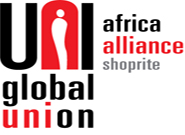Shoprite Union Alliance strengthens social dialogue

Shop stewards and trade union officials from 15 countries met in Cape Town from 1 – 4 March for the annual meeting of the Shoprite Checkers Global Union Alliance. The main focus of this meeting was to prepare for the joint session with the company on 3rd March, a meeting which would provide the Alliance with a starting point for the further development of the relationship with the company.

The meeting was held against a background of the easing of the global economic crisis, though 2010 was a difficult year which saw global retailers struggling and job creation still low in the retail sector. However, Shoprite Checkers managed not only to maintain its position as the largest African retailer but increased its ranking to an impressive number 95. This position is an improvement in rank of about 40 places and further widens the gap between Shoprite Checkers and its two closets rivals Pick’N’Pay and Massmart, both of which faired comparatively bad last year.
The Alliance heard reports from each of the countries present and even if there were no systemic breaches of the ILO Conventions on behalf of the company reported, delegates talked about a wide range of issues which the company needs to improve on, ranging from supplying uniforms to unsafe offloading procedures. Another important issue raised by the delegates was shrinkage otherwise known as “shop theft” or “graft”, and as this was reported on it became glaringly clear, that the issue is an actual problem. Shoprite management locally is often quick to put the blame squarely on the shop workers while obvious possible culprits like managers that actually have the keys to the stores, the stock taking procedure, failure by the supply chain to deliver correct volumes and the inclusion of discounted goods when shrinkage was accounted for are not considered.
On 3rd March the Alliance met with company management which had arranged forseveral of their senior decision makers in various fields to be present so the Alliance would get a high level input about the company. Following the company’s presentation on its current situation a debate on the working conditions took place, and while emphasizing that the global agreement was not a collective bargaining tool, issues of general concern was raised with the company. One of the more important ones was the issue of shrinkage and accepting that resolving this would be of mutual benefit, the company readily accepted to start of process together with the Alliance on how to best deal with this complex issue, much inspired by the positive results a similar process had produced in South Africa together with SACCAWU.
The meeting was held in a positive and constructive atmosphere and the Alliance look forward to engage further with the company in a spirit of constructive problem-solving and to continue the development of the social dialogue process within the company.

Members of the Alliance can access the assigned webplace to find more information.

